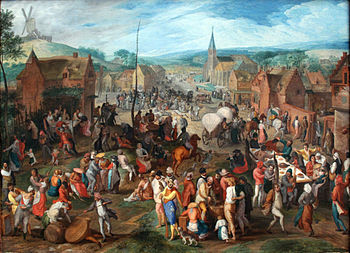Portal:Business
The Business and Economics Portal Business is the practice of making one's living or making money by producing or buying and selling products (such as goods and services). It is also "any activity or enterprise entered into for profit." A business entity is not necessarily separate from the owner and the creditors can hold the owner liable for debts the business has acquired. The taxation system for businesses is different from that of the corporates. A business structure does not allow for corporate tax rates. The proprietor is personally taxed on all income from the business. A distinction is made in law and public offices between the term business and a company such as a corporation or cooperative. Colloquially, the terms are used interchangeably. (Full article...) Economics (/ˌɛkəˈnɒmɪks, ˌiːkə-/) is a social science that studies the production, distribution, and consumption of goods and services. Economics focuses on the behaviour and interactions of economic agents and how economies work. Microeconomics analyses what's viewed as basic elements in the economy, including individual agents and markets, their interactions, and the outcomes of interactions. Individual agents may include, for example, households, firms, buyers, and sellers. Macroeconomics analyses the economy as a system where production, distribution, consumption, savings, and investment expenditure interact, and factors affecting it: factors of production, such as labour, capital, land, and enterprise, inflation, economic growth, and public policies that have impact on these elements. (Full article...) Selected articlePanavision is an American motion picture equipment company specializing in cameras and lenses, based in Woodland Hills, California. Formed by Robert Gottschalk as a small partnership to create anamorphic projection lenses during the widescreen boom in the 1950s, Panavision expanded its product lines to meet the demands of modern filmmakers. The company introduced its first products in 1954. Originally a provider of CinemaScope accessories, the company's line of anamorphic widescreen lenses soon became the industry leader. In 1972, Panavision helped revolutionize filmmaking with the lightweight Panaflex 35 mm movie camera. The company has introduced other groundbreaking cameras such as the Millennium XL (1999) and the digital video Genesis (2004). Panavision operates exclusively as a rental facility—the company owns its entire inventory, unlike most of its competitors. Selected image
Selected economyThe economy of Italy is a highly developed social market economy. It is the third-largest national economy in the European Union, the second-largest manufacturing industry in Europe (7th-largest in the world), the 9th-largest economy in the world by nominal GDP, and the 12th-largest by GDP (PPP). Italy is a founding member of the European Union, the Eurozone, the OECD, the G7 and the G20; it is the eighth-largest exporter in the world, with $611 billion exported in 2021. Its closest trade ties are with the other countries of the European Union, with whom it conducts about 59% of its total trade. The largest trading partners, in order of market share in exports, are Germany (12.5%), France (10.3%), the United States (9%), Spain (5.2%), the United Kingdom (5.2%) and Switzerland (4.6%). In the post-World War II period, Italy saw a transformation from an agricultural-based economy which had been severely affected by the consequences of the World Wars, into one of the world's most advanced nations, and a leading country in world trade and exports. According to the Human Development Index, the country enjoys a very high standard of living. According to The Economist, Italy has the world's 8th highest quality of life. Italy owns the world's third-largest gold reserve, and is the third-largest net contributor to the budget of the European Union. Furthermore, the advanced country private wealth is one of the largest in the world. In terms of private wealth, Italy ranks second, after Hong Kong, in private wealth to GDP ratio. Among OECD members, Italy has a highly efficient and strong social security system, which comprises roughly 24.4% of GDP. (Full article...) Selected quote"The money influence—the pressing to make a profit on an "investment"—and its consequent neglect of skimping of work and hence of service showed itself to me in many ways. It seemed to be at the bottom of most troubles. It was the cause of low wages—for without well-directed work high wages cannot be paid. And if the whole attention is not given to the work it cannot be well directed. Most men want to be free to work; under the system in use they could not be free to work. During my first experience I was not free—I could not give full play to my ideas. Everything had to be planned to make money; the last consideration was the work. And the most curious part of it all was the insistence that it was the money and not the work that counted. It did not seem to strike any one as illogical that money should be put ahead of work—even though everyone had to admit that the profit had to come from the work. The desire seemed to be to find a short cut to money and to pass over the obvious short cut—which is through the work."
TopicsRelated WikiProjectsDid you know (auto-generated) -
On this day in business history
General imagesThe following are images from various business-related articles on Wikipedia.
More did you know
Business news Wikinews Economy and business portal
|







































